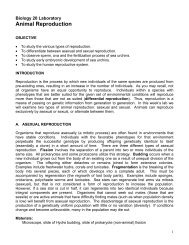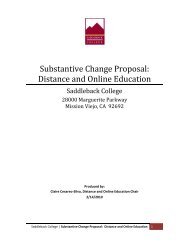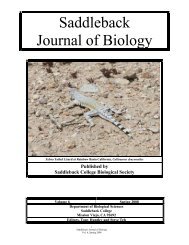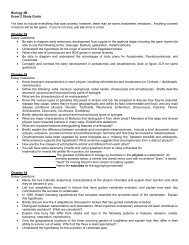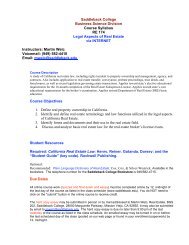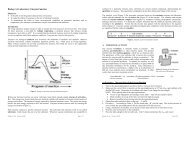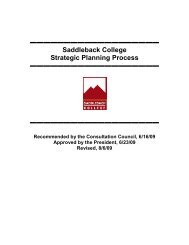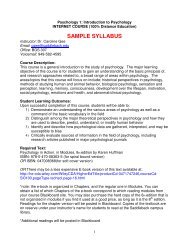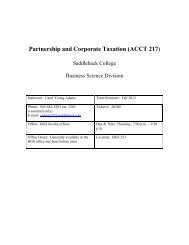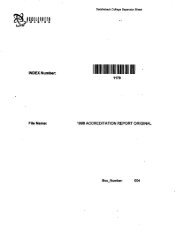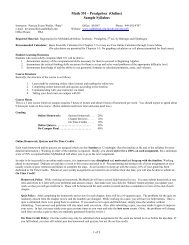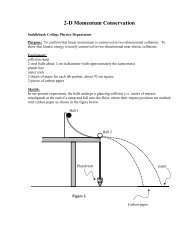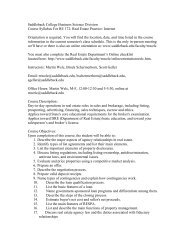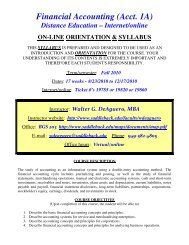Saddleback Journal of Biology - Saddleback College
Saddleback Journal of Biology - Saddleback College
Saddleback Journal of Biology - Saddleback College
Create successful ePaper yourself
Turn your PDF publications into a flip-book with our unique Google optimized e-Paper software.
Fall 2009 <strong>Biology</strong> 3B Paper<br />
The Effect <strong>of</strong> Aerobic Exercise on Human Short-Term Memory<br />
Yousif Astarabadi and Hannah Ogren<br />
Department <strong>of</strong> Biological Science<br />
<strong>Saddleback</strong> <strong>College</strong><br />
Mission Viejo, CA 92692<br />
Blood glucose has been shown to have a great impact on the enhancement <strong>of</strong> short<br />
term memory in humans. In this study, glucose was used as a variable to test the hypothesis<br />
that short term memory will increase after aerobic exercise. The hypothesis was assessed<br />
by testing subjects with a memory test both before and after exercise, and by recording the<br />
amount <strong>of</strong> number sequences recalled for both. Glucose was used a variable, so the<br />
investigators tested the blood glucose levels <strong>of</strong> the participants before and after taking the<br />
two memory tests. The average number sets recalled in the initial memory test prior to<br />
exercise was 4.6 ± 0.476 (±SEM, n=10) and 7.3 ± 1.27 (±SEM, n=10) in the post exercise<br />
memory test. A one tailed, paired t-test revealed that the number <strong>of</strong> sets remembered after<br />
exercise is significantly greater than before exercise (p=0.003). An ANOVA test revealed<br />
that there was no significance in the differences between the glucose levels (p=0.417).<br />
However, there was significant evidence to support the claim that exercise increases shortterm<br />
memory in humans.<br />
Introduction<br />
Whether it is doing homework, studying, or<br />
taking a test, many news outlets report that students<br />
should exercise because it will boost their<br />
concentration, memory, and performance on everyday<br />
school tasks. Short term memory is the ability to retain<br />
a small amount <strong>of</strong> information for a brief period <strong>of</strong><br />
time. This can be important while studying because it<br />
allows one to access the learned information while still<br />
allowing them to input new information. This study<br />
will investigate whether exercise has a significant<br />
impact on short term memory.<br />
Exercise is believed to increase short term<br />
memory due to the fact that exercise naturally increases<br />
blood glucose levels. Wahren et al, confirmed this in<br />
their study by finding that “peripheral glucose<br />
utilization increases in exercise despite a reduction in<br />
circulating insulin levels…” Another study conducted<br />
by Colombani et al (1996), found in their placebo test<br />
that glucose levels increase after exercise. And<br />
“glucose… can improve aspects <strong>of</strong> cognitive<br />
performance…” (Scholey et al. 2004) Therefore, by<br />
having the subjects exercise before taking a test, the<br />
results should show that there was an increase in short<br />
term memory.<br />
To prove that memory increased the subjects<br />
took a test and see if their results increased after<br />
exercise. When a memory test was conducted by<br />
Benton and Owens, the results showed, “There was a<br />
significant correlation between blood glucose values<br />
and the number <strong>of</strong> words recalled. Those whose blood<br />
glucose levels were increasing remembered<br />
significantly more words than those whose blood<br />
glucose levels were falling.” This proves that the<br />
glucose had a significant impact on the test outcomes.<br />
Materials and Methods<br />
The study was performed on November, 7,<br />
2009, at 10:30 am in Laguna Niguel, California. Ten<br />
participants were used in this study, five male and five<br />
female, ages eighteen to twenty-two. They were chosen<br />
based on their GPA’s <strong>of</strong> the previous semester and<br />
their current study habits. All <strong>of</strong> the participants fasted<br />
prior to participating and all <strong>of</strong> the participants were<br />
hydrated before the study was started.<br />
During this study, the participants took an<br />
initial memory test with out having exercised or eaten<br />
prior. Their blood glucose levels were taken and<br />
recorded prior to the start <strong>of</strong> the memory test with a<br />
Bayer One Touch Glucose Monitor. The area where the<br />
blood was taken from was first sterilized with an<br />
alcohol wipe. The finger was then pricked with a<br />
lancet, and the first drop <strong>of</strong> blood was wiped away with<br />
a cotton ball to prevent contamination. The memory<br />
test consisted <strong>of</strong> a random number sequence <strong>of</strong> twenty<br />
numbers, between two and four digits in length, and<br />
was generated from a random number generator. The<br />
participants had five minutes to memorize the test, and<br />
after they finished studying they waited for five<br />
minutes and then wrote down as many numbers as they<br />
could recall for four minutes. After the test was taken<br />
123<br />
<strong>Saddleback</strong> <strong>Journal</strong> <strong>of</strong> <strong>Biology</strong><br />
Spring 2010



